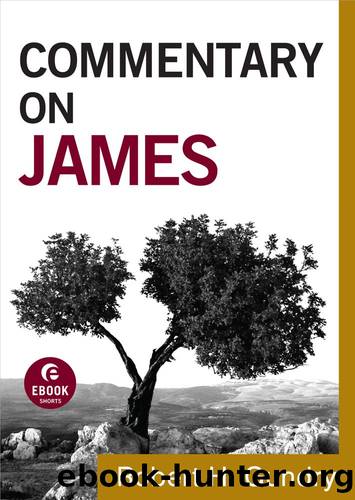Commentary on James (Commentary on the New Testament Book #16) by Robert H. Gundry

Author:Robert H. Gundry [Gundry, Robert H.]
Language: eng
Format: mobi
Tags: Epistle of the Apostle James, REL006070, Bible New Testament Commentaries, REL006100
Publisher: Baker Publishing Group
Published: 2011-10-31T16:00:00+00:00
AN EXHORTATION TO COOPERATIVE WISDOM
James 3:13–4:3
3:13–16: Who [is] wise and understanding among you? With the meekness of wisdom he’s to show his works [= deeds] by good behavior. 14But if you have bitter jealousy and ambition in your heart, don’t be boasting and lying against the truth. 15This wisdom isn’t coming down from above; rather, [it’s] earthly [in its origin], soulish [arising out of the human soul rather than infused by the Holy Spirit], demonic [even worse than “soulish” because of being characteristic of demons (at best) or infused by demons (at worst)]. 16For where jealousy and ambition [exist], there [exist] instability and every sort of vile deed. The preceding rhetorical questions lead James to introduce this following exhortation with another such question. It harks back to the theme of wisdom in 1:5. But there wisdom was possibly absent. Here it’s possibly present. And for emphasis James adds “understanding” to “wisdom.” The wisdom he’s looking for among his audience is characterized by “meekness,” the toleration of mistreatment (like being cursed?) without striking back (compare “slow to anger” in 1:19–21). Though generally despised in non-Christian culture, meekness is wise in that striking back only generates further conflict. The deeds of a wise and understanding Christian, then, are to be done with meekness or, more accurately, are to be shown with meekness. For showing them proves his faith (2:18). And “good behavior” defines his deeds as such proof, especially since “good” connotes visible goodness, even beauty.
Over against meekness and good behavior James ranges “bitter jealousy and ambition,” both of which forestall meekness and wreak havoc on good behavior. “Bitter jealousy” recalls the bitter water of 3:11 and adds animosity to the jealousy. “In your heart” traces the bitter jealousy and ambition to their inner source, so that James saves himself from advocating that you show your good deeds to elevate your status among other Christians. Bitter jealousy and ambition normally lead to boasting for the purpose of achieving one-upmanship and higher status. But James writes that bitter jealousy and ambition should keep you from boasting; for if you have them, you don’t have anything worth boasting about. And to boast would be to lie against the truth that in fact you don’t have anything to boast about, which truth is part and parcel of the gospel: “Nothing in my hands I bring. Only to thy cross I cling.” With “this wisdom” that “isn’t coming down from above” James shifts dramatically from the wisdom that characterizes meekness to the “earthly” wisdom that advocates boasting as the way to get ahead. Then he returns to the origins of boasting in jealousy and ambition and says that because jealousy and ambition spawn “instability and every sort of vile deed” (James is referring to disorder and recriminations of Christians against each other in their assemblies), the so-called wisdom characterized by jealousy and ambition deserves the downward spiraling descriptions unheavenly, earthly, soulish, and even demonic (see explanations interspersed in the foregoing translation). “Demonic” recalls that an unrestrained, impulse-driven tongue “is set on fire by hell.
Download
This site does not store any files on its server. We only index and link to content provided by other sites. Please contact the content providers to delete copyright contents if any and email us, we'll remove relevant links or contents immediately.
Ideology by Eagleton Terry;(492)
Hebrews, James by George H. Guthrie & George H. Guthrie(468)
Israel: Ancient Kingdom or Late Invention? by Daniel I. Block(460)
The 9.9 Percent by Matthew Stewart(456)
Take Back Your Time by Christy Wright(435)
The New Oxford Annotated Bible with Apocrypha by unknow(434)
Eating the Bible by Rena Rossner(427)
Insights on Hebrews by Charles R. Swindoll(423)
The Book Every Leader Needs to Read by 48 Authors(415)
Psalms, Proverbs, Ecclesiastes, and Song of Songs by John W. Hilber & Tremper Longman III & Duane Garrett(382)
Commentary on the Torah by Richard Elliott Friedman(364)
Judges: Volume Two by unknow(360)
Who Wrote the Bible? by Richard Elliott Friedman(359)
The Jew in the Lotus by Rodger Kamenetz(357)
Commentary on James (Commentary on the New Testament Book #16) by Robert H. Gundry(354)
NKJV, Ignite, eBook by Thomas Nelson(344)
Job, Ecclesiastes, Song of Songs by August H. Konkel & Tremper Longman III(343)
Proverbs, Ecclesiastes, Song of Solomon (Ancient Christian Commentary on Scripture) by J. Robert Wright(341)
Reading the Bible with Rabbi Jesus by Tverberg Lois(322)
